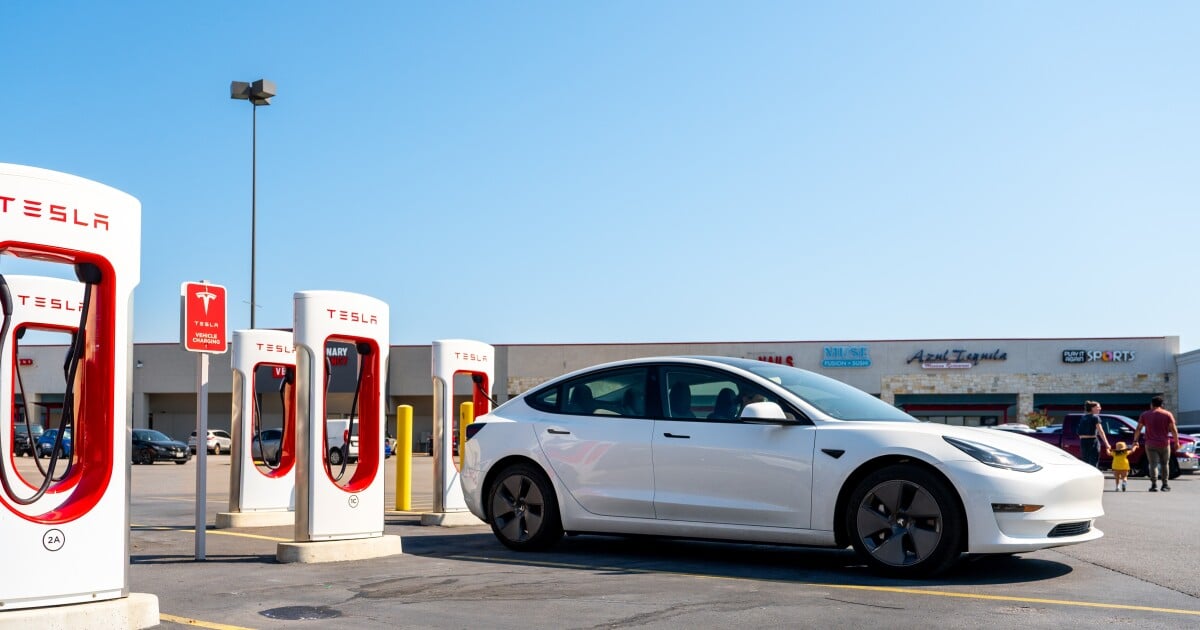Everyone knows that electric vehicles are supposed to be better for the planet than gas cars. That’s the driving reason behind a global effort to transition toward batteries.
But what about the harms caused by mining for battery minerals? And coal-fired power plants for the electricity to charge the cars? And battery waste? Is it really true that EVs are better?
The answer is yes. But Americans are growing less convinced.
The net benefits of EVs have been frequently fact-checked, including by NPR. "No technology is perfect, but the electric vehicles are going to offer a significant benefit as compared to the internal combustion engine vehicles," Jessika Trancik, a professor at the Massachusetts Institute of Technology, told NPR this spring.
It’s important to ask these questions about EVs’ hidden costs, Trancik says. But they have been answered “exhaustively” — her word — and a widerange of organizations have confirmed that EVs still beat gas.
deleted by creator
Automotive tires are a leading source of microplastics so EVs aren’t exactly a darling angel
Could we not just make tires out of a different material?
it’s not just capitalism, the US is a very spread out place compared to most other countries. if you want everyone to use mass transit you’re asking them to either 1) move into the city for similar commute times, or 2) spend an inordinate amount of time riding busses around the suburbs for the same distance commute. Neither are good solutions.
And also we have solved the “getting to work” debate with teleconferencing. why should we need cars or an even bigger mass transit system when most people can simply work from home?
Eh there are plenty of places that have less population density than the US but they do just fine with transit. It might be true that most US cities are poorly designed for transit, but the density isn’t a the reason.
can you really blame us?
let me run through the last 8 years of American history with four words, “we were lied to”. doesn’t matter from whom, doesn’t matter what. we’re constantly being lied to. truth is, it’s been true for longer than 8 years, but the last 8 have been especially transparent.
we’re learning that the upper echelon only trusts the American public to do three things; consume, produce, and die. if you can’t even do that for them, you’re removed as an undesirable.
so yeah, trust in the system is broken. it’s going to take at least a generation or two just to repair it ** if they work on it**.
I can’t fault anyone who’s untrusting of a system that continuously covers lie after lie with more lies.
8 Years?
How long did fossil fuel companies know about climate change?
How long did the fuel industry know about the effects of leaded petrol?
How long did cigarette companies know about links to cancer?
How long did pharma companies know about opioid addiction risk?
How long did social networking companies know about psychological manipulation?
How long did the sugar lobby know about their links to diabetes and obesity?
How long did the manufacturing companies know about PFAS and microplastics?I would say you have always been lied to.
Your forgot that plastic manufacturing knew it wasn’t recycled or recyclable.
I can’t fault anyone who’s untrusting of a system that continuously covers lie after lie with more lies
I can and will. Learn some basic critical thinking skills and apply them. Throwing your hands up and ranting about how “the system is broken” is mopey teenager shit.
Things are far more complicated than your whiny rant. They world is shades of gray rather than the simplistic “bad guy in black / good guy in white” situation that you characterize it as.
You overestimate the general populations intelligence.
Very true.
The only valid criticisms of EV’s are:
-
They’re harder to extinguish than a gas car if they end up catching on fire.
-
They don’t really solve any of the major issues with car based infrastructure.
-
Tesla is a shit show because of that damn muskrat which pushes a lot of people away from EV’s in general.
-
Put them in a sealed room with a gas engine running and you’ll see how fast they realize that they’re cleaner
Fair, but the first rebuttal is going to be “go into a sealed room with a coal fire burning”
… how is that an argument?
Isn’t the whole point that the gas engine equivalent is just in somebody else’s room though?
In any case, I’ll take whatever partial climate wins we can get.
Solar, wind, and nuclear energy: are we a joke to you?
An even larger portion of America can’t afford them, so it doesn’t even matter.
deleted by creator
Check out auctions, feds and locals are always dumping cars. They can be a decent bit cheaper than dealerships with better maintenance and lower prices, talking SUV with sub 20,000 miles on it for $2,000 cheap.
Removed by mod
Its about 40% more power efficient per mile but theres a couple of other trade-offs, still better yeah.
Because we Americans are easily swayed by propaganda, unfortunately.
Because the conservative machine, despite the love of Elon’s right-wing antics, never stop talking about how bad EVs are. Funny, the only time they act like they care about the environment is when they talk about how bad the EV batteries are to manufacture. While they roll coal and drive gas-guzzling mall cruiser bro-dozers all over the place.
Give him a few years into a potential Trump victory, and he will make Tesla to manufacture petrol cars.
zombie engineer voice “traiiiiiins”
IMO, I still think there’s not enough infrastructure to support charging EVs. Don’t get me wrong I’ve seen some. Just… Not a lot. Until charging is as prevalent as gas its just not worth it. Or if you have a house I guess.
In some areas I hear it’s good. But in my area there’s only 1 set of charging stations at a Wawa that I know of. And that Wawa is an hour drive away. Plus I’m at a rental complex that mows the lawns regularly and having a cable run from my house to the car is not allowed.
My current gas operated vehicle has about 160000 miles on it. I’m hopeful that my vehicle will last a long time. And then when my vehicle dies, I’ll look at the infrastructure again and see if it’s beneficial for me to switch to an EV. I’m going to continue to wait until it’s beneficial for me to buy a new car.
We’ll see how it goes.
Well, gas stations don’t really want electric because it would cut into their main source of revenue so I think I may have spotted the bottleneck.
The only way charging stations will become prevalent is if municipalities start setting them up. Either that or grocery stores. Though Answers with Joe made an interesting case for Buccees adopting charging stations as a method of generating revenue through increased tourism at their locations.
Gas stations actually make almost all of their money on things other than gas that people buy while they are at the gas station. It’s true that people wouldn’t come to existing gas stations nearly as much if they weren’t buying gas but they could make as much or more from users charging.
The real problem from their perspective is how infrequently users may need such especially if they charge at home and the cost of charging infra which is always in addition to gas not instead of
I was always under the impression that the source of the electricity to charge electric vehicles matters greatly. Some areas use coal burning to generate power while others use hydroelectric.
Definitely better to charge an EV with clean energy. But it’s probably better to charge an EV with dirty electricity than it is to keep using a combustion vehicle.
IIRC a gas vehicle is something like 20% thermally efficient, whereas a coal/oil power plant can be up to 60%. So even if my EV is charging off oil or coal, I’m getting 3x the energy per unit of emissions compared to a gas vehicle (though who knows how that translates to miles of range).
It does matter in terms of how much less polluting it would be. Even in case of coal plant bonansa it reaches a point where it becomes less poluting than gasoline car . Alghtough much slower. Its also not realy important since renewables became so cheap that there is practicly no country that dosent have a fairly significant renewable share ( and by that i mean > 10 % ).
Hybrids actually have the best longevity and repair scores, however.
The longevity of the vehicle actually does count towards its ecological impact, because if you have to replace it sooner, you’re creating a bigger ecological impact of creating a short-term use device before more energy has to be used to recycle parts of it.
So, at the moment hybrids win that battle. I think its simply because hybrids have been around longer, not because they’re special. Give it about 10-15 more years and I think you’ll see a flip to EVs taking over that spot from hybrids.
EDIT: Also, the bad build quality of Teslas and the early adopters of EVs mostly being Tesla owners also means that the sample of hybrids having better longevity and repair scores is impacted by Tesla specifically being so bad. If you cut out Teslas from the equation, I bet EVs and hybrids would probably have similar longevity and repair scores.
I’d like to see a source that says hybrids, with two separate engines plus the mechanical linkages between them plus the transmission, have better repair scores than a pure EV with no transmission, no mechanical engine, and a simpler drivetrain.
Anecdotal, but my parents bought a first-gen Prius way back in 2000 and it had zero mechanical issues until my niece rear-ended someone in 2012. Since it was so old it was totaled, but the battery pack was still very healthy.
I’m skeptical that hybrids with ICEs and transmissions at their heart really do have more longevity than BEVs and electric motors. ICE and especially hybrids are inherently more complex than BEVs, and have many more moving mechanical parts to wear out over time. So while BEVs may technically be “harder to repair”, there’s actually much less to repair in the first place. not to mention less maintenance like dozens of oil changes over the life of the car.
Where did you get that info about the hybrid longevity, an episode of Comedy Bang Bang? Could it be due to hybrids not running the gas engines full-time (less wear hours of usage per mile) ?
The only hybrid I’ve driven tends to run the engine more as a power generator than to drive the wheels, and often uses no gas engine. I could see how the engine would be less worn from that kind of usage vs driving the wheels all the time.
I heard about this, although the positive news is it’s mostly people who weren’t in the market for an EV to begin with so it doesn’t really impact EV sales or anything. Still hate to see disinformation win, though.
I’m a bit sad to hear Congress is more or less outlawing Chinese cars here, though. Affordable EVs are far and few between and it really feels like the national security rational they’re giving thinly hides the real reason of preventing competition for US car makers, as if they even planned on making a decent EV.
I believe it, but I don’t give a shit. I buy a car/truck because of how capable it is, and how easy repairs are to do myself, not because of how many smug Californian’s circlejerk over it.
Having just pulled repaired and put an engine back in one of my cars. No ICE cars are much harder to repair. Range will probably be an issue for a while. What I’m really excited for is hybrid light duty vehicles like a 1 ton hybrid would be great.















